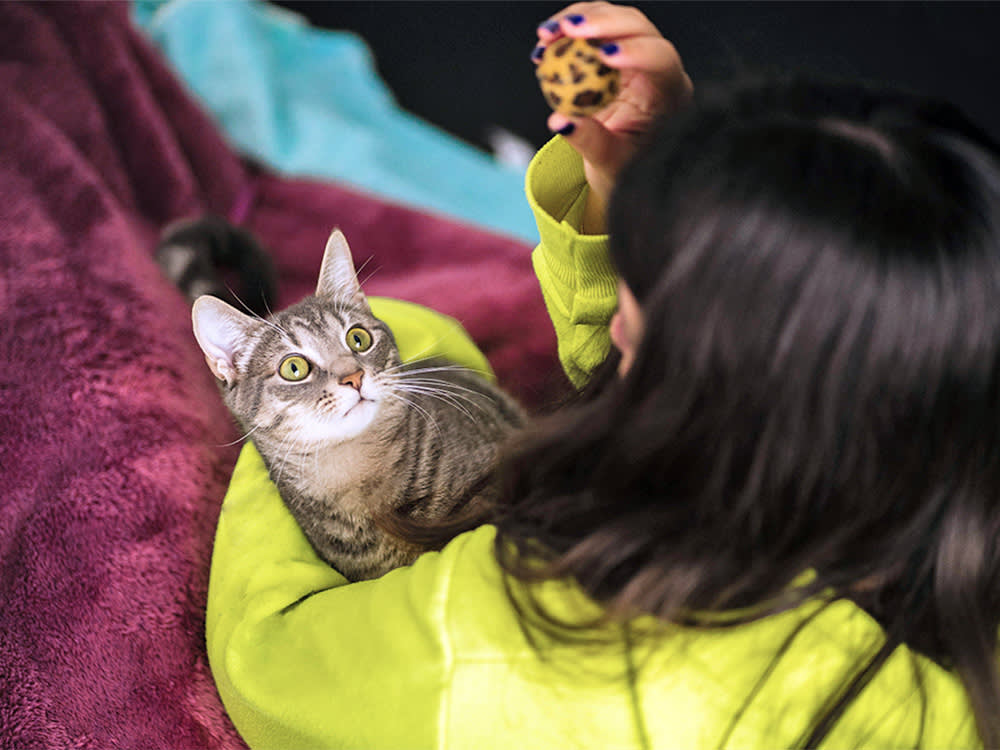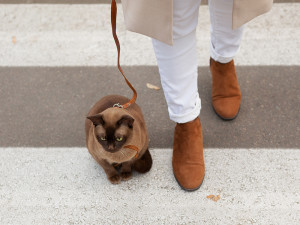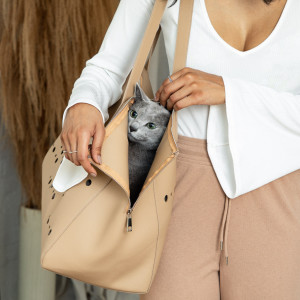Cats Like Playing Fetch Too, New Study Finds
The classic game isn’t just for dogs.

Share Article
Every day, the gap between Cat People and Dog People narrows. Thanks to science, we’ve learned that, like dogs, cats can be trained to walk on a leash,opens in new tab use speech buttons,opens in new tab or respond to their nameopens in new tab — some cats even enjoy swimming.opens in new tab Now, researchers have discovered another thing that cats and dogs have in common: the desire for a good old-fashioned game of fetch. A new surveyopens in new tab found that over 40 percent of cats enjoy the pastime.
The study
To find out how common it was for cats to engage in a game of fetch, researchers surveyed 8,224 pet parents who each described the frequency of 100 different feline behaviors.
The researchers found that overall, 40.9 percent of cats were reported to sometimes, usually, or always play fetch. Cats who were kept indoors and lived in homes without dogs were more likely to play fetch. Female cats were less likely to play fetch; older cats and cats with health problems fetched less, too.
Those weren’t the only play behaviors the pet parents reported: 58 percent of cats carried toys or objects, and 39 percent initiated interactive play by bringing toys to their pet parents.

When they conducted a survey on dogs, they found that 77.8 percent of dogs like the game — meaning almost half as many cats as dogs are playing fetch.
Why do cats like to fetch?
When it comes to dogs, experts have a pretty good idea why they’re fetch fans. “It is likely that dogs were selected for retrieving behavior during domestication, probably in the context of human hunting with projectile weapons,” the study’s lead author Dr. Mikel Delgado wrote. But cats weren’t domesticated in this way — so why are they half as fetch-obsessed?
The researchers suggest that a game of fetch taps into a cat’s hunting instincts. “All aspects of the fetching sequence likely relate to predatory behavior,” Dr. Delgado wrote. “Cats are stalk-and-rush hunters, engaging in short-distance chasing of moving prey.” After catching prey, cats in the wild often take the winnings away to a safer location or to their offspring.
Plus, there’s the obvious: It’s fun. Cats love to play, and fetching behaviors were highly correlated with playful personalities — in fact, they were more highly correlated with playfulness and activity than with prey interest and predatory behaviors. If your cat loves to run, jump, and engage with items around the house (like, for example, that one piece of string they somehow got their paws on), they might also like retrieving their favorite catnip toy.
“We hope that the study draws more attention to fetching behavior in cats — who are often portrayed as independent or aloof,” Dr. Delgado told PLOS.opens in new tab “In fact, they can be very social and this is a nice example of one way they are interactive with humans.”

Sio Hornbuckle
Sio Hornbuckle is the Assistant Editor at Kinship, where they frequently write for the site. As a writer, they specialize in pet news, animal science, and pop culture. They live in New York City with their cat, Toni Collette.
Related articles
![A Burma breed cat on a leashed harness sitting near a feet of a girl at a pedestrian crossing.]()
How to Walk Your Cat on a Leash
Adventure Cats author Laura Moss’s step-by-step guide for hitting the streets with your cat.
![adventure cat walking on a bridge in harness and leash]()
Could Your Cat Be an Adventure Cat?
How you can train your cat to explore the great outdoors.
![A gray cat in a tan cat carrier]()
How to Get a Cat in a Carrier
Here’s how you can train your stubborn cat to do one of their least-favorite things.
![An angry and hissing Siamese kitten standing on top of a laptop computer in the living room]()
You Don’t Have to Live Like This—You Can Get a Trainer For Your Cat
Tips to help you find a legit behaviorist (according to a veterinary behaviorist).
![A fluffy Siamese cat sitting on the wooden floor playing with a the Snake Cat Toy from Boba and Vespa next to a striped Calathea plant]()
7 Cat Kicker Toys That Will Help Your Cat Beat Their Boredom
The cat kicker toys that will keep your cat booked and busy (and kicking like they’re Megan Rapinoe).
![White cat with black head spots standing in front of verbal buttons on the living room floor]()
Speech Buttons Aren’t Just for Dogs — Cats Are Chiming In, Too
Cat behaviorist Kristiina Wilson and her viral cat, Steve, are successfully communicating with speech buttons.






